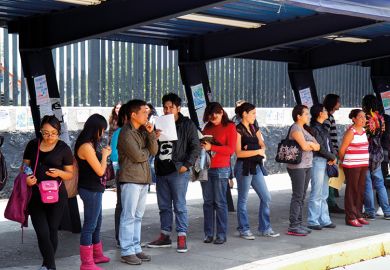Universities bring economic and social benefits to the communities in which they are located. They encourage skilled jobs and boost local economies through students’ spending both on and off campus – and have been integral to the regeneration of some towns and cities.
Our research across the country, for the National Conversation on Immigration, found that these benefits were felt in the towns and cities where universities are based, with people stating that the university contributed to an outward-looking civic identity and was a symbol of civic pride.
Yet the benefits that universities bring are not evenly spread across the UK. In the past 10 years, it has been the elite institutions and larger teaching universities, almost always based in the UK’s biggest cities, that have expanded at the greatest rate.
So one of the recommendations of the National Conversation on Immigration is that the government review university growth and establish a new wave of university building, similar to the Robbins Report expansion of the 1960s that called for further education institutions to be awarded university status.
There should also be clear criteria for deciding the location of these new universities, which should include socio-economic need as well as proximity to other institutions. Building them in places that have experienced economic decline – where there are fewer skilled local jobs, or in social mobility “cold spots” – are potential guidelines.
They should be committed to lifelong learning and provide courses below degree level, with strong links to local businesses. In the National Conversation’s final report, we suggest 10 potential locations and in some of them – Derry-Londonderry, Peterborough, Doncaster and Shrewsbury – there are already local campaigns calling for a university.
Why did a public consultation on immigration end up talking about universities and students? In part because so many migrants who come to the UK are students. In the academic year 2016-17, 442,375 students from outside the UK were studying at UK higher education institutions.
But that is not the only reason. Our research also looked at the factors underlying attitudes to immigration, including the social and economic divides that were revealed so clearly in the EU referendum vote in 2016.
Brexit is a reset moment. It is a chance to put in place an immigration strategy that works for businesses and universities – and has public support.
But that public support will not be won unless we engage the public in the immigration debate and the policy changes they want. This is what British Future and Hope not Hate have been doing over the last 18 months through the National Conversation on Immigration.
As well as an open, online survey and nationally representative polling by ICM Research, we held more than 130 meetings in 60 towns and cities across every nation and region of the UK, where we met with stakeholders – including universities – and groups of local residents in “citizens’ panels”.
Most people saw international students as students rather than migrants and had few concerns about abuse of student visas. They could see the benefits that international students brought to their local area.
Off-campus spending by international students was seen as beneficial for local retailers and had led to the regeneration of high streets. Some citizens’ panels believed that international student migration had helped universities to expand and bring additional skilled jobs to the area.
In places such as Aberystwyth and Lincoln, citizens panels felt that the presence of international students had contributed to an outward-looking ethos in their towns. Many people took great pride in their local university, with many of these institutions described as the “finest in the world”.
The vast majority (84 per cent) of those we spoke to were happy for student migration to be increased or to remain at the same level, a finding supported in our larger survey.
Government policy that directly or indirectly discourages the recruitment of international students is not endorsed by the public.
Yet support for student migration is not unconditional. We found town and gown conflict in places such as Durham and the student accommodation building frenzy is starting to cause tensions elsewhere.
If these issues are not addressed they have the potential to damage public support for universities, including support for recruiting international students. If universities wish to continue to expand, they will need to do more to build relationships with the communities in which they are located. We recommend that all universities produce a community plan.
We were struck by the difference that a university makes to a town, but we also saw many towns that had missed out on higher education expansion. As Brexit looms, a new wave of university building could boost the economy in some of our struggling towns and send out the message that the UK is confident, united and outward looking.
Jill Rutter is director of strategy for the thinktank British Future and co-author of the new report from the National Conversation on Immigration.
Register to continue
Why register?
- Registration is free and only takes a moment
- Once registered, you can read 3 articles a month
- Sign up for our newsletter
Subscribe
Or subscribe for unlimited access to:
- Unlimited access to news, views, insights & reviews
- Digital editions
- Digital access to THE’s university and college rankings analysis
Already registered or a current subscriber? Login



